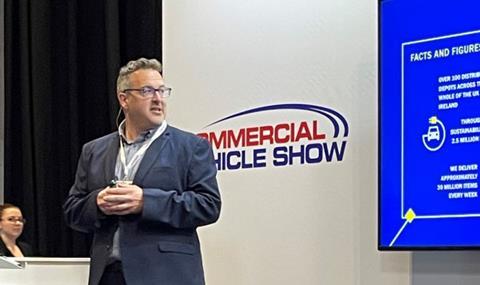
Menzies Distribution has placed orders for a further 16 longer semi-trailers (LSTs) to take its fleet of 15.65m trailers to 93 after the government announced on August 24 that, after reviewing the 31 responses to its consultation on its LST trial, ministers “have decided that LSTs should be allowed into general circulation with light regulatory control on their use”.
The original trial involved LSTs of 14.6m and 15.65m operating within the UK’s existing domestic weight limit of 44 tonnes. It was originally scheduled to run for a maximum of 10 years from 2012 with a total allocation of 1,800 LSTs operating under vehicle special orders (VSO). In 2017 the government increased the number of LSTs by 1,000 and extended the trial to 2027.
Speaking at the Motor Transport Future Transport workshop on day one of the CV Show, Adam Purshall (pictured), fleet and procurement director of Menzies Distribution Group, said there had been “huge benefits” from LSTs for both the operator and its customers in the FMCG packaging sector.
Menzies, which acquired Bibby Distribution in 2020, uses single and double-deck box van and curtainsided LSTs on products such as packaging that cube before they weigh out. Full loads of empty food cans for example weigh just 3 tonnes so the extra four pallets the LSTs can carry have cut 11% from the mileage required to deliver them to food manufacturers.
“We have been in the trial since 2012 and currently have 71 LSTs with seven more on order,” said Purshall. “As a result of last week’s announcement we will be buying another 16 next year.”
Describing the trial as a “huge success”, Purshall said there had been “no safety issues and it has delivered what we wanted in terms of the environment and our operations”.
“Driver training gave us the safety performance and there were no major incidents,” he said.
Purshall added, however, that introducing LSTs had to be done in partnership with customers as there had been some minor issues with loading bays. “You need the space to operate them,” he said. “At one site they stuck out across the pedestrian walk way so we had to relocate them.”
Read more
- Government gives green light to LSTs and announces trial of 48-tonne trucks
- Menzies Distribution secures £14m term loan to drive future growth
- Menzies acquires JBT Distribution as growth plan accelerates
The lack of availability of LSTs due to uncertainty over the length of the trial had also been an issue, though there had been no mechanical problems with the self-steering rear axles and the LSTs had proven as reliable as Menzies’ conventional semis.
Welcoming the government decision to make LSTs “business as usual”, Purshall said it would free operators and manufacturers to spend more money on them.
“We are now at the point of investing capital in LSTs and it is fantastic that they have made the decision that they will evolve,” he said. “The next phase is to move to 48 tonnes for road-rail operations.”
Menzies took its initial batch of LSTs on seven-year leases which it then extended to 10 years and it now plans to replace the LST fleet on its standard 10-year trailer life cycle.
Results of the LST trial (2019)
• 5.9 million journey legs travelled by LSTs during the trial
• 739 million kms travelled by LSTs during the trial (analysis in 2017 showed LST usage to be 85% trunk, 13% principal and 2% minor roads)
• 54 to 60 million vehicle kms ‘saved’ by LST operations at the end of 2019 (upper estimate includes matched empty return legs)
• On average, the use of LSTs reduced journey numbers by 1 in 12 (8%)
• 48,000 tonnes of CO2 and 241 tonnes of NOx have been saved
• On a per kilometre basis LSTs have been involved in about 53% fewer personal injury collisions and casualties than the GB articulated heavy goods vehicle average
Number of LSTs in use (2020)
• 2,696 (96%) LSTs registered on VSOs and not registered as scrapped (% of trial target of 2,800 trailers)
• 2,621 (93%) LSTs on the road and submitted trial data (% of trial target of 2,800 trailers)
• 250 operators with trailers on the road
Source: DfT













